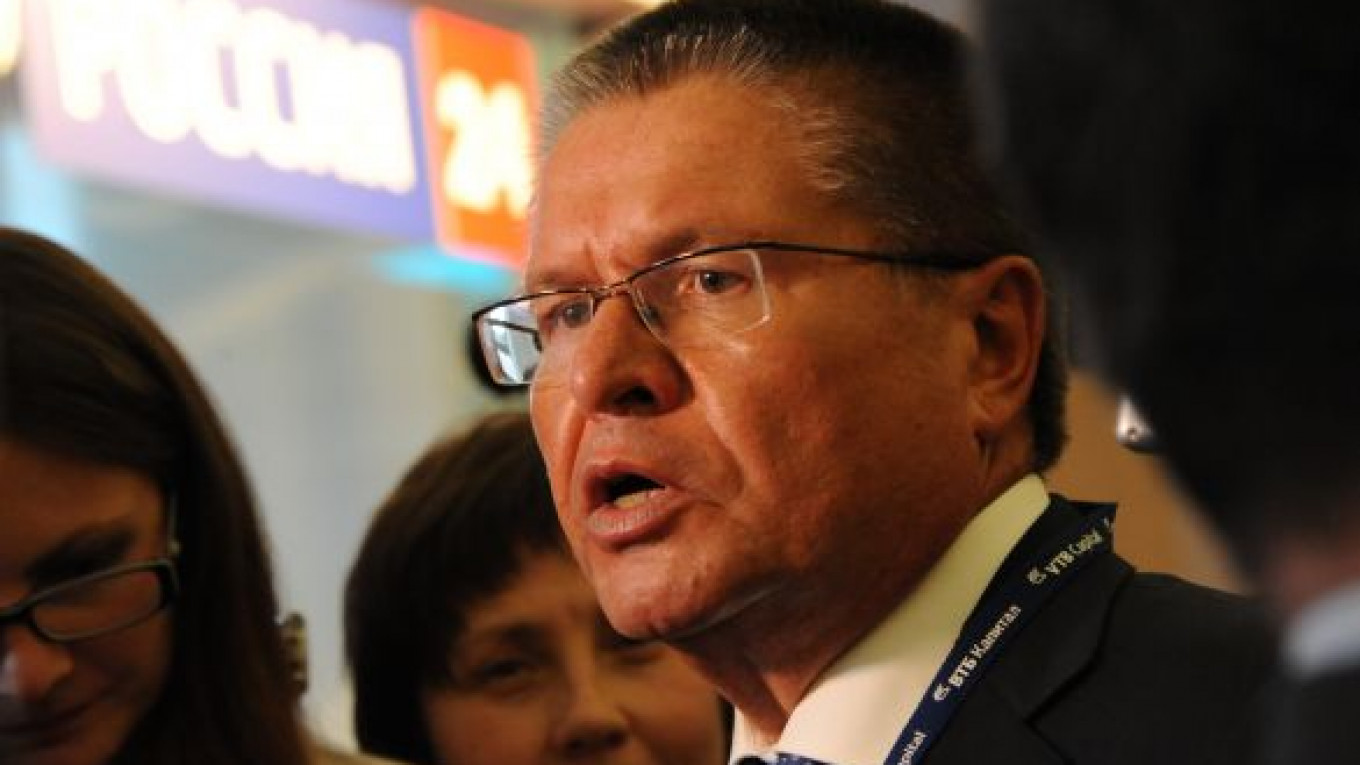The newly appointed Economic Development Minister Alexei Ulyukayev said Monday that his main task was to prevent a recession, while Prime Minister Dmitry Medvedev said the government expected a 400 billion ruble ($12 billion) budget deficit in 2014.
Ulyukayev, who served as first deputy chairman of the Central Bank for almost a decade before being appointed economic development minister on Monday, outlined his future policy at a meeting with President Vladimir Putin.
He indicated that he would try to pursue his policy without relying on high oil prices, but added that his task would be hard.
“It is one thing to assume leadership when you have a 7 percent economic growth rate [per year], but it is another one then we're hardly getting 3 percent,” he said, Interfax reported.
Ulyukayev's predecessor Andrei Belousov became an economic aide to Putin in what was seen as a major government reshuffle that could set a new tone for economic policy. Elvira Nabiullina, who preceded Belousov as economic development minister from 2008 to 2012, officially took office as head of the Central Bank on Tuesday.
Ulyukayev will set a more liberal economic agenda in the Cabinet, but he will be counterbalanced by interventionists in Putin's administration, including Belousov, experts said.
The soft-spoken Ulyukayev, also known for his poetry, started his career in academic circles and joined the team of liberal reformer Yegor Gaidar as an economic adviser in the early 1990s.
He worked as first deputy finance minister under then-Finance Minister Alexei Kudrin from 2000 to 2004 and became first deputy head of the Central Bank in 2004.
Meanwhile, Belousov is known for more statist economic views, which are more in line with Putin's principles, according to experts.
By assuming a post at the presidential administration, Belousov will join the ranks of several former ministers who became Putin's aides after he took office as president last May.
Though the current Cabinet is headed by Dmitry Medvedev, a former president, many analysts see it as politically weak and unstable.
Putin, who called Ulyukayev's post a “key one,” said that he saw the Cabinet's economic team as a group of “like-minded” professionals.
The appointments symbolize a power shift from economic liberals close to Kudrin, including Ulyukayev, to “interventionists” like Belousov and left-wing economist Sergei Glazyev, who also works as presidential adviser, said Sergei Markov, vice president of the Plekhanov Russian University and a Kremlin-leaning political expert.
Markov, who described Ulyukayev as a “market fundamentalist,” said he would face a difficult task because their views on state interference in the economy differ.
Natalya Akindinova, a senior expert at the Higher School of Economics, said Ulyukayev was a representative of “Gaidar's economic school.” She added that while his predecessor Belousov favored higher infrastructure spending, Ulyukayev would care more about improving the business climate, ITAR-TASS reported.
But Markov, who also described Ulyukayev as a “wise man,” said his position might change him.
“Take Gref, for example. He came as a market fundamentalist, but later started to advocate a bigger government role,” Markov said.
He was referring to German Gref, who was economic development and trade minister from 2000 to 2007 and now heads Sberbank, the nation's biggest lender.
Former Labor and Social Development Minister Alexander Pochinok, who had crossed paths with Ulyukayev while working at the Cabinet, also described the new economic development minister as a “calm and thoughtful man.”
“He was always trying to make a balanced decision. While being an academic, he has also become a good administrator during all those years,” Pochinok said.
A poet who published a book titled “Foreign Shores” last year, Ulyukayev has said he finds relief when writing poetry. His philosophical verse, full of hidden messages, has won critical acclaim.
“When everything is fine, you don't write. But when something doesn't satisfy you, poetry comes to you. Poetry is when a good man feels bad,” Ulyukayev told Rossiyskaya Gazeta last year.
But Ulyukayev will hardly find time for poetry writing while occupying one of the most senior positions at the Cabinet as the country faces a difficult economic situation.
It is still unclear how much freedom he will have in his economic policy. Analysts said it would become clearer after Ulyukayev appointed his deputies.
The economic development minister currently has nine deputies. FIve of them assumed their positions during Belousov's tenure.
Analysts said that Belousov would have a higher status than that of a Cabinet minister.
Some experts have compared Putin's administration with the Soviet Politburo, whose powerful secretaries oversaw the work of government ministers, and said the president's assistants have more clout than the Cabinet.
“Belousov's post is very important,” Markov said.
But he added that Ulyukayev received a much better job than the one he had before. Being an influential policymaker himself, he would not be able to work under the equally strong Nabiullina at the Central Bank, Markov said.
Contact the author at a.bratersky@imedia.ru
Related articles:
A Message from The Moscow Times:
Dear readers,
We are facing unprecedented challenges. Russia's Prosecutor General's Office has designated The Moscow Times as an "undesirable" organization, criminalizing our work and putting our staff at risk of prosecution. This follows our earlier unjust labeling as a "foreign agent."
These actions are direct attempts to silence independent journalism in Russia. The authorities claim our work "discredits the decisions of the Russian leadership." We see things differently: we strive to provide accurate, unbiased reporting on Russia.
We, the journalists of The Moscow Times, refuse to be silenced. But to continue our work, we need your help.
Your support, no matter how small, makes a world of difference. If you can, please support us monthly starting from just $2. It's quick to set up, and every contribution makes a significant impact.
By supporting The Moscow Times, you're defending open, independent journalism in the face of repression. Thank you for standing with us.
Remind me later.






